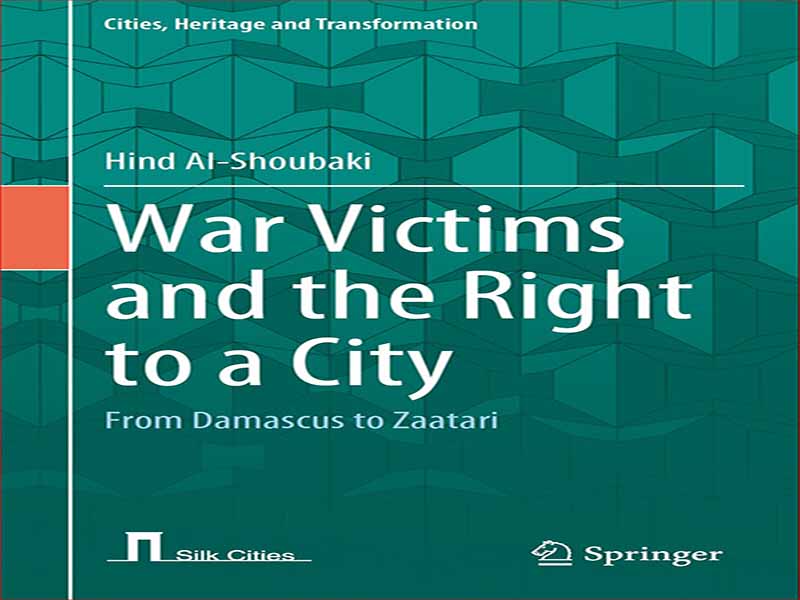- عنوان کتاب: War Victims and the Right to a City
- نویسنده/انتشارات: Hind Al-Shoubaki
- حوزه: جنگ
- سال انتشار: 2022
- تعداد صفحه: 135
- زبان اصلی: انگلیسی
- نوع فایل: pdf
- حجم فایل: 6.58 مگابایت
ایده این کتاب زمانی آغاز شد که برای گرفتن دکترا به ایتالیا نقل مکان کردم. در برنامه ریزی فضایی تصمیم گرفتم تحقیقاتم را از واقعیتی متفاوت انجام دهم که در آن شهرها در نتیجه جنگ و درگیری با چالشهای پیچیدهای مواجه میشوند. در نتیجه، در دوره دکتری من. در برنامه، تحقیقات من بر روی یک موضوع حیاتی از دگرگونیهای شهری متمرکز بود: کمپهای پناهندگان یا، همانطور که به این پدیده پرداختم، «شهرهای موقت». پس از بحث در مورد پایان نامه ام، هدف قطعی این بود که دیدگاه خود را در مورد این پدیده در شهرهای پس از جنگ اعلام کنم و می خواستم صدایم را در سطح بین المللی به گوش برسد. خوشبختانه، پس از چند گفتگوی عالی با پروفسور اندرو جیمز هاپکینز، توانستم با پروفسور نابغه پروفسور فرناز عارفیان که به اندازه کافی لطف داشت و پیشنهاد کتاب من را بررسی کرد، ملاقات کنم. همانطور که خواهید دید، این کتاب حق شهروندی قربانیان جنگ را مورد بحث قرار می دهد. به عبارت دیگر، نیاز پناهندگان و شهروندانی که پس از جنگ ها به وطن خود باز می گردند، برای داشتن شهری واقعی، دائمی و کاربردی. این چارچوبی را ارائه میکند که شهرسازی، مدیریت اضطراری، و برنامهریزی شهری یکپارچه را برای بحث در مورد نیاز فوری پناهندگان به یک شهر، با استفاده از موضوع آوارگی پس از درگیری ناشی از جنگ داخلی سوریه، به عنوان مدرک ارائه میکند. در نتیجه، نیاز به یک برنامه شهری جدید را برای فراهم کردن شهرهای کاملاً کاربردی برای دو نوع قربانی جنگ شرح می دهد: پناهندگان در کشورهای میزبان و کسانی که به وطن خود باز می گردند. این کتاب این نیاز فوری را در دو مورد بحرانی مورد بحث قرار می دهد: پناهندگان سوری در اردوگاه آوارگان زعتری و جمعیت بازگردانده شده در دمشق. شرایط فعلی آنها را ارزیابی می کند و شکاف های موجود در سیاست شهری را که با بازسازی های پس از جنگ سروکار دارد پر می کند. تازگی این مطالعه در ایجاد این ترکیب موردی متقاطع است که به ترسیم حقوق قربانیان جنگ در یک شهر واقعی، نه یک پناهگاه یا اردوگاه کمک می کند. فراتر از آن، این مطالعه با ایجاد یک چارچوب مفهومی برای بازسازی پس از جنگ در مورد جنگ داخلی سوریه به ادبیات کمک می کند. به طور خلاصه، این کتاب یک چارچوب مفهومی جدید و جامع برای بازسازی پس از جنگ ارائه میکند که نشاندهنده گامی به سوی درک چگونگی مقابله با نیاز فوری به مسکن با نتایج بلندمدت است که به پیشبرد برنامه شهری جدید برای داخلی کمک میکند. و توسعه دهندگان خارجی در زمینه بازسازی.
The idea behind this book was initiated when I moved to Italy to get my Ph.D. in spatial planning. I decided to conduct my research coming from a different reality where cities confront complex challenges as a result of wars and conflicts. Consequently, during my Ph.D. program, my research focused on a critical issue of urban transformations: refugee camps or, as I addressed the phenomenon, “temporary cities.” After discussing my dissertation, I had the definite purpose of promulgating myperspective about this phenomenon in post-war cities, and Iwanted to letmy voice be internationally heard. Fortunately, after a couple of great conversations with Prof. Andrew James Hopkins, I was able to meet with the genius Prof. Farnaz Arefian, who was gracious enough to review my book proposal. As you will see, this book discusseswar victims’ right to a city. In other words, the need for refugees and citizens returning to their homelands after wars to have a real, permanent, functional city. It presents a framework that links urbicide, emergency management, and integrated urban planning to discuss refugees’ immediate need for a city, using as evidence the issue of post-conflict displacement resulting from the Syrian civil war. Consequently, it describes the need for a new urban agenda to provide fully functional cities for two types of war victims: refugees in host countries and those returning to their homelands. This book discusses this urgent need within two critical cases: the Syrian refugees in the Zaatari refugee camp and the repatriate population in Damascus. It assesses their current conditions, filling the gaps in urban politics that deal with post-conflict reconstructions. The novelty of this study is in creating this cross-case synthesis that helps to draw the rights of war victims in a real city, not a shelter or a camp. Beyond that, this study contributes to the literature by creating a conceptual framework for post-conflict reconstruction in the case of the Syrian civil war. In summary, this book provides a novel, comprehensive conceptual framework for post-conflict reconstruction, which represents a step toward understanding how to deal with the urgent need for housing with more long-term outcomes that will help in advancing a new urban agenda for internal and external developers in the reconstruction field.
این کتاب را میتوانید از لینک زیر بصورت رایگان دانلود کنید:
Download: War Victims and the Right to a City



































نظرات کاربران